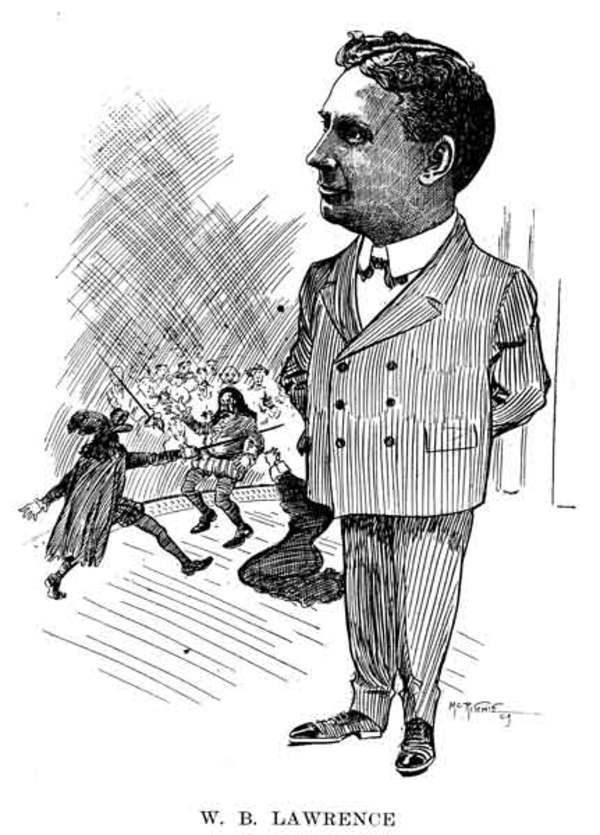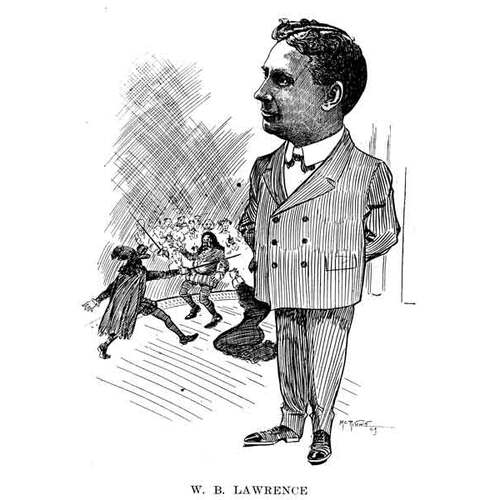
Source: Link
LAWRENCE, WILLIAM BLAKE, theatre manager; b. 23 Feb. 1870 in Gainesville, N.Y.; m. Nellie A. —; d. 15 May 1918 in Winnipeg and was buried in Detroit.
William Blake Lawrence was raised in Detroit, where with little formal education he worked his way from errand boy to manager of the Detroit Opera House. In 1906 he was manager of the Colonial Theatre in Cleveland, Ohio, a legitimate stock house owned by the American theatrical firm Drew and Campbell, based in Detroit. That year Drew and Campbell acquired the Winnipeg Theatre and transferred him there as its manager. Lawrence brought the company from the Colonial Theatre with him, renaming it the Winnipeg Stock Company. In 1909, after a competing company was installed at the Grand Opera House in Winnipeg, Lawrence himself leased the Grand, combined the new company with his own at the Winnipeg Theatre, and introduced a stock melodrama company at the Grand.
In the same year Lawrence also leased the Dominion Theatre, a vaudeville house in Winnipeg, and switched its booking contract from the Orpheum Theatre chain, an American organization that dominated vaudeville in the mid and western United States, to William Morris, an independent agent. Morris was challenging the near-monopoly of vaudeville productions established by the alliance of the Orpheum chain and the United Booking Office. Having deprived the vaudeville monopoly of an outlet in Winnipeg, Lawrence challenged another monopoly by converting the Winnipeg Theatre from a stock theatre into a touring house under contract to the Shubert brothers, who were at that time engaged in an all-out war with the powerful Theatrical Syndicate of New York. This move put Lawrence in direct competition with Winnipeg theatre magnate Corliss Powers Walker* and his large-scale touring business. Walker, who owned or controlled theatres in Manitoba, Minnesota, and North Dakota, and had close links with the syndicate, played an important role in the theatre business of western Canada.
In 1910, when Martin Beck of the Orpheum circuit announced that he intended to build a new theatre in Winnipeg, Lawrence and Walker struck a deal to consolidate their dominance of the city’s theatrical scene. Walker purchased the Winnipeg Theatre and assumed management of it, disengaging from his contract with the syndicate and running the theatre as a touring house featuring the Shubert brothers’ productions. Lawrence took over management of the Walker Theatre, running it as a vaudeville house and booking first-class acts through Morris. He retained management of the Dominion, where he installed the Permanent Players, a reconstituted stock company.
By 1911 Morris had withdrawn from vaudeville and a truce had been arranged between the syndicate and the Shuberts. Walker resumed management of the Walker Theatre with a contract from the syndicate which now made provision for independent offerings from the Shuberts and others. Lawrence leased the Winnipeg Theatre from Walker and moved the Permanent Players there, while turning the Dominion Theatre, renamed the Empress Theatre, into a vaudeville house on the Sullivan-Considine circuit.
In the meantime, Lawrence allied himself with Alexander Pantages, who was launching a new challenge to the dominance of vaudeville by the alliance of the Orpheum circuit and the United Booking Office. Lawrence arranged local financing for the building of the Pantages Theatre, which opened in February 1914 under his management as a leading house in the developing Pantages chain. He then withdrew the Sullivan-Considine vaudeville program from the Empress, renamed that theatre the New Dominion Theatre, and moved the Permanent Players there, converting the Winnipeg Theatre into a movie-house. He actively managed the Pantages, Dominion, and Winnipeg theatres until late 1916, when he suffered a paralytic stroke, from which he never recovered.
As the local representative of William Morris, the Shuberts, the Sullivan-Considine circuit, and Alexander Pantages, William Blake Lawrence kept Winnipeg a theatrically open city, increasing competition and thwarting attempts to maintain a monopoly of touring attractions. At the same time, his creation and management of first-rate stock companies developed a market for locally produced theatre which proved to be an important stimulus to the subsequent development of indigenous professional theatre companies.
Manitoba Free Press, 1906–18. Variety (New York), 1910. Winnipeg Town Topics, 1906–13. Winnipeg Tribune, 1906-18. Reg Skene, “C. P. Walker and the business of theatre: merchandizing entertainment in a continental context,” in The political economy of Manitoba, ed. James Silver and Jeremy Hull (Regina, 1990), 128–50.
Cite This Article
Reg Skene, “LAWRENCE, WILLIAM BLAKE,” in Dictionary of Canadian Biography, vol. 14, University of Toronto/Université Laval, 2003–, accessed April 4, 2025, https://www.biographi.ca/en/bio/lawrence_william_blake_14E.html.
The citation above shows the format for footnotes and endnotes according to the Chicago manual of style (16th edition). Information to be used in other citation formats:
| Permalink: | https://www.biographi.ca/en/bio/lawrence_william_blake_14E.html |
| Author of Article: | Reg Skene |
| Title of Article: | LAWRENCE, WILLIAM BLAKE |
| Publication Name: | Dictionary of Canadian Biography, vol. 14 |
| Publisher: | University of Toronto/Université Laval |
| Year of revision: | 1998 |
| Access Date: | April 4, 2025 |



